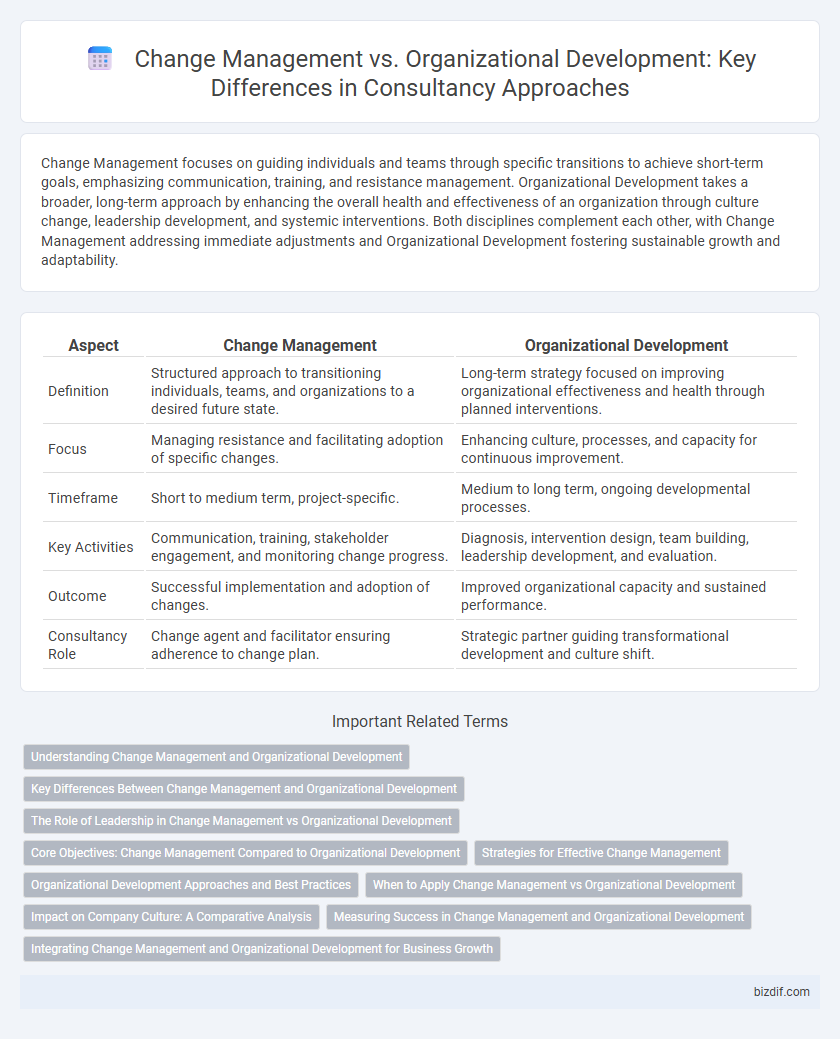Change Management focuses on guiding individuals and teams through specific transitions to achieve short-term goals, emphasizing communication, training, and resistance management. Organizational Development takes a broader, long-term approach by enhancing the overall health and effectiveness of an organization through culture change, leadership development, and systemic interventions. Both disciplines complement each other, with Change Management addressing immediate adjustments and Organizational Development fostering sustainable growth and adaptability.
Table of Comparison
| Aspect | Change Management | Organizational Development |
|---|---|---|
| Definition | Structured approach to transitioning individuals, teams, and organizations to a desired future state. | Long-term strategy focused on improving organizational effectiveness and health through planned interventions. |
| Focus | Managing resistance and facilitating adoption of specific changes. | Enhancing culture, processes, and capacity for continuous improvement. |
| Timeframe | Short to medium term, project-specific. | Medium to long term, ongoing developmental processes. |
| Key Activities | Communication, training, stakeholder engagement, and monitoring change progress. | Diagnosis, intervention design, team building, leadership development, and evaluation. |
| Outcome | Successful implementation and adoption of changes. | Improved organizational capacity and sustained performance. |
| Consultancy Role | Change agent and facilitator ensuring adherence to change plan. | Strategic partner guiding transformational development and culture shift. |
Understanding Change Management and Organizational Development
Change Management focuses on guiding individuals and teams through specific transitions using structured processes and communication strategies to minimize resistance and maximize adoption. Organizational Development emphasizes a holistic, systemic approach to improving organizational effectiveness through planned interventions that address culture, leadership, and processes. Understanding the distinctions between Change Management and Organizational Development enables consultants to tailor strategies that align with the unique needs and goals of an organization.
Key Differences Between Change Management and Organizational Development
Change Management concentrates on guiding individuals and teams through specific transitions to minimize resistance and ensure smooth implementation, primarily focusing on short-term process adjustments and project-based changes. Organizational Development emphasizes long-term, systematic transformations to improve an organization's overall health, culture, and capacity for continuous improvement through strategic interventions and employee engagement. Key differences include their scope, with Change Management addressing discrete changes, while Organizational Development targets ongoing organizational growth and effectiveness.
The Role of Leadership in Change Management vs Organizational Development
Leadership in change management drives transformation by setting clear visions, managing resistance, and ensuring effective communication throughout the transition. In organizational development, leadership fosters a culture of continuous improvement, employee engagement, and collaborative problem-solving to enhance long-term organizational effectiveness. Both approaches require leaders to align strategies with business goals while adapting leadership styles to meet the evolving needs of the workforce.
Core Objectives: Change Management Compared to Organizational Development
Change Management primarily aims to facilitate smooth transitions during specific organizational changes by minimizing disruption and ensuring stakeholder buy-in. Organizational Development focuses on long-term improvement of organizational effectiveness through culture, processes, and capacity-building initiatives. Both disciplines share goals of enhanced performance but differ in scope, with Change Management targeting immediate change adoption and Organizational Development driving systemic growth.
Strategies for Effective Change Management
Effective change management strategies prioritize clear communication, stakeholder engagement, and continuous training to ensure smooth transitions within organizations. Emphasizing leadership alignment and setting measurable goals helps in mitigating resistance and maintaining momentum during change initiatives. Integrating these strategies with organizational development principles fosters a resilient culture capable of adapting to evolving business environments.
Organizational Development Approaches and Best Practices
Organizational Development (OD) approaches emphasize holistic transformation through continuous learning, employee engagement, and systemic interventions to enhance organizational effectiveness. Best practices in OD include leveraging data-driven diagnostics, fostering participative leadership, and implementing tailored coaching programs that align with corporate culture and strategic objectives. These methods drive sustainable change by integrating behavioral science with business processes, distinguishing OD from focused change management initiatives.
When to Apply Change Management vs Organizational Development
Change Management is applied during specific transitions, such as technology implementation or restructuring, where managing resistance and communication is critical for short-term success. Organizational Development focuses on long-term culture transformation, enhancing organizational effectiveness through continuous learning and development initiatives. Use Change Management for targeted, time-bound changes and Organizational Development for sustained growth and systemic improvements.
Impact on Company Culture: A Comparative Analysis
Change management primarily focuses on guiding individual and team transitions during specific initiatives, directly influencing company culture by promoting adaptability and resilience. Organizational development encompasses a broader, continuous process aimed at enhancing overall organizational effectiveness, embedding values and behaviors that shape long-term culture transformation. Both approaches impact company culture, but change management typically drives short-term cultural shifts, whereas organizational development fosters sustained cultural evolution.
Measuring Success in Change Management and Organizational Development
Measuring success in Change Management involves evaluating employee adoption rates, project milestones, and the achievement of predefined KPIs aligned with business objectives. Organizational Development success is assessed through metrics such as employee engagement scores, cultural assessments, and long-term performance improvements. Both require continuous feedback loops and data-driven analysis to ensure sustainable transformation and organizational resilience.
Integrating Change Management and Organizational Development for Business Growth
Integrating change management and organizational development aligns strategic initiatives with employee engagement, enhancing adaptability and sustained business growth. By combining structured change processes with continuous organizational improvement, companies can effectively manage transitions while nurturing a culture of innovation and responsiveness. This holistic approach drives productivity, reduces resistance, and fosters long-term competitive advantage in dynamic markets.
Change Management vs Organizational Development Infographic

 bizdif.com
bizdif.com